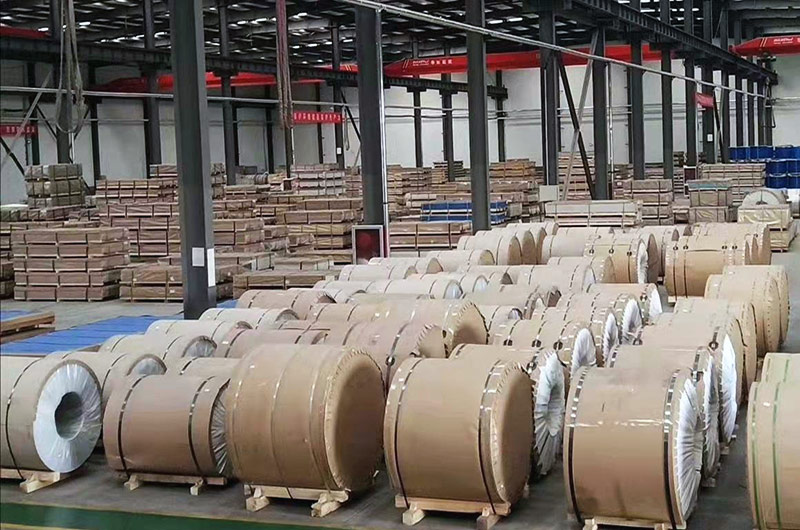

Jun. 19, 2024
Haomei Aluminum emphasizes the importance of proper storage after purchasing aluminum coils. Improper storage can easily lead to oxidation, which undermines the purpose of purchasing aluminum coils. Therefore, it is crucial to understand the best practices for storing aluminum coils to prevent oxidation.

1. Wrap the Coils in Plastic Film
If possible, store the coils with desiccants to absorb moisture from the air, thereby preventing oxidation.
2. Humidity Control in Wooden Boxes
If the coils are stored in wooden boxes, ensure that the humidity of the wood is less than 18% and the temperature of the aluminum coils does not exceed 45°C.
3. Temperature Transition
If the storage environment changes from a low temperature to a high temperature, do not open the packaging immediately. Allow the coils to acclimate to the new temperature before unsealing to prevent oxidation.
4. Avoid Leaks in the Storage Area
Ensure that the storage area is free from leaks of rain or snow, as exposure to moisture can lead to oxidation.
One of the most effective ways to prevent aluminum coil oxidation is to store them in a controlled environment. This involves maintaining specific levels of temperature, humidity, and air quality in the storage area.
Temperature Control:
Extreme temperatures accelerate the oxidation process. Maintain storage temperatures between 15°C to 25°C (59°F to 77°F). Minimize temperature fluctuations to prevent condensation on the coils.
Humidity Control:
Moisture in the air leads to corrosion and oxidation. Keep humidity levels below 50% using dehumidifiers or desiccants strategically placed in the storage area.
Air Quality:
Minimize exposure to pollutants like sulfur dioxide, hydrogen sulfide, and other corrosive gases. Use air filtration systems and ensure regular ventilation to maintain clean air quality.
Proper handling and packaging of aluminum coils are crucial to preventing oxidation during storage. Follow these specific procedures to ensure the coils are adequately protected from external factors that can cause corrosion.
Cleanliness:
Ensure coils are clean and free of contaminants such as dirt, oil, or grease before storage. Clean the coils with mild detergent and water solutions, then thoroughly rinse and dry them to remove any surface impurities that may accelerate oxidation.
Protective Coatings:
Applying protective coatings or surface treatments can provide an additional barrier against oxidation. Common coatings include varnish, anodizing, or specialized anti-corrosion coatings designed for aluminum surfaces.
Proper Packaging:
Use materials that offer adequate protection against environmental factors when packaging aluminum coils for storage. This may include wrapping the coils in plastic film or VCI (volatile corrosion inhibitor) paper to prevent moisture exposure. Using robust packaging containers, such as cardboard boxes or wooden crates, helps prevent physical damage and minimizes exposure to corrosive elements.
Regular inspections and maintenance are essential to ensure the long-term preservation of aluminum coils. This proactive approach allows for early detection of any signs of oxidation or corrosion, enabling timely intervention to prevent further degradation.
Visual Inspections:
Conduct regular visual inspections to assess the condition of the aluminum coils. Look for discoloration, pitting, or white powdery residues, which are common signs of oxidation. Investigate any anomalies to determine the root cause and take appropriate corrective actions.
Corrosion Monitoring:
Implement a corrosion monitoring program to track the rate of oxidation and identify potential areas of concern within the storage facility. This may involve using corrosion sensors or probes to measure environmental factors such as humidity, temperature, and air quality, allowing for proactive adjustments to mitigate corrosion risks.
Preventive Maintenance:
Include regular activities such as cleaning, lubricating, and reapplying protective coatings as part of a preventive maintenance plan for aluminum coils. This helps extend their lifespan and ensures they remain in optimal condition throughout the storage period.
In conclusion, preventing aluminum coils from oxidizing during storage requires a comprehensive approach that addresses environmental factors, handling procedures, and maintenance practices. By implementing these preventive measures, along with diligent monitoring and proactive intervention, the risk of oxidation can be minimized, preserving the integrity of aluminum coils over the long term.
Please feel free to write down your requirement in the form below. We will reply you within 24 hours and we will protect your personal privacy information.